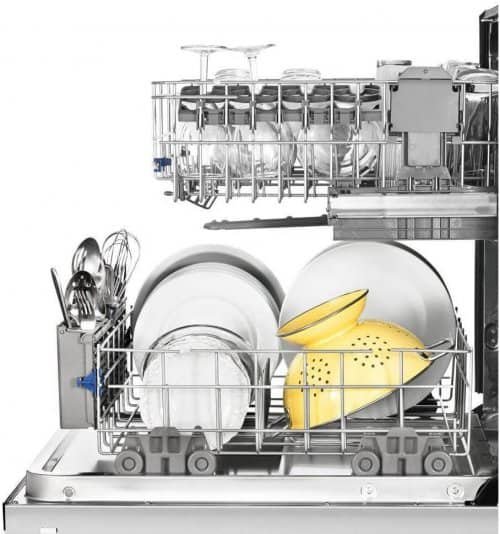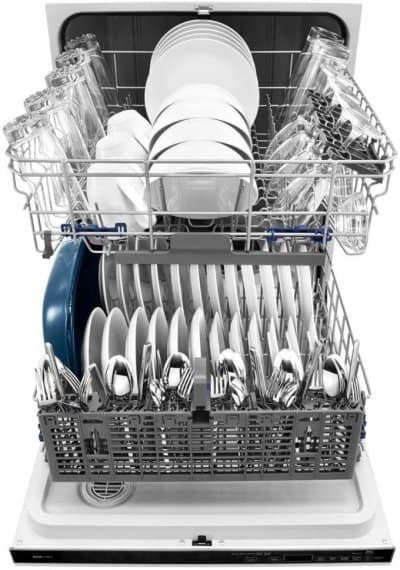Dishwashers are essential appliances in modern kitchens, designed to make our lives more convenient by taking care of the dirty dishes. However, sometimes they can develop an unpleasant odor that lingers even after a wash cycle. If you find yourself wondering, “Why does my dishwasher smell bad?” you’re not alone. In this article, we will explore the common causes of bad smells in dishwashers and provide practical tips on how to prevent and eliminate them.
Dishwashers are prone to developing bad smells due to various factors, including leftover food particles, mold and mildew growth, grease buildup, and more. These issues can lead to an unpleasant odor that affects not only your dishes but also the overall cleanliness of your kitchen. Understanding the root causes of dishwasher odors and implementing preventive measures can help keep your dishwasher smelling fresh and clean.
Table of Contents
Common Causes of Bad Smell in Dishwashers
- Food Residue
- Grease and Oil Buildup
- Clogged Filters
- Standing Water
- Mold and Mildew
- Hard Water Deposits
- Food Residue: One of the primary reasons for a foul-smelling dishwasher is leftover food residue. When food particles remain in the dishwasher after a wash cycle, they can decompose and produce unpleasant odors. It’s important to scrape off excess food from your dishes before loading them into the dishwasher to prevent this issue.
- Grease and Oil Buildup: Over time, grease and oil can accumulate in your dishwasher, particularly in hard-to-reach areas like the filter, spray arms, and drain. This buildup can emit a rancid smell that affects the cleanliness of your dishes. Regular cleaning and maintenance are crucial for preventing grease and oil buildup.
- Clogged Filters: Filters in dishwashers play a vital role in trapping food particles and preventing them from recirculating onto your dishes. However, if the filters become clogged, they can harbor food debris, leading to unpleasant odors. Cleaning or replacing the filters regularly can help keep your dishwasher odor-free.
- Standing Water: When water remains stagnant in your dishwasher for an extended period, it can create a breeding ground for bacteria, resulting in a musty smell. This can happen if your dishwasher doesn’t drain properly or if you leave wet dishes inside for too long. Ensuring proper drainage and promptly emptying the dishwasher after each cycle can help combat this issue.
- Mold and Mildew: Dishwashers that are not adequately cleaned and dried after each use are prone to mold and mildew growth. These fungi thrive in moist environments and can produce a foul smell. Regular cleaning, including wiping down the interior and door seals, can help prevent mold and mildew buildup.
- Hard Water Deposits: If your area has hard water, mineral deposits can accumulate in your dishwasher over time. These deposits can contribute to a musty odor and affect the performance of your dishwasher. Regular descaling using vinegar or specialized dishwasher cleaners can help remove these deposits and keep your dishwasher smelling fresh.

Tips for Preventing and Eliminating Odors from Dishwasher
To ensure your dishwasher remains odor-free, here are some practical tips you can follow:
- Regular Cleaning Routine
- Proper Loading Techniques
- Use of Vinegar or Baking Soda
- Cleaning the Filter
- Running an Empty Cycle
- Using Dishwasher Cleaner Products
- Regular Cleaning Routine: Develop a cleaning routine for your dishwasher. This includes wiping down the interior walls, door seals, and control panel with a damp cloth regularly. Pay special attention to the areas prone to food and grease buildup.
- Proper Loading Techniques: Properly load your dishes to ensure optimal water circulation and drainage. Avoid overcrowding, as it can lead to poor cleaning and trap food particles. Also, scrape off excess food before loading to minimize the chances of residue buildup.
- Use of Vinegar or Baking Soda:Vinegar and baking soda are natural cleaning agents that can help eliminate odors in your dishwasher. Place a cup of white vinegar or a small bowl of baking soda on the top rack and run a hot water cycle to neutralize smells and remove stains.
- Cleaning the Filter: Regularly clean the dishwasher filter to prevent food particles from accumulating and causing odors. Refer to your dishwasher’s manual for instructions on how to locate and clean the filter properly.
- Running an Empty Cycle: Occasionally, run an empty cycle with hot water and a dishwasher cleaner. This helps remove any buildup, sanitize the interior, and eliminate odors. Follow the instructions on the cleaner’s packaging for the best results.
- Using Dishwasher Cleaner Products: Consider using specialized dishwasher cleaner products that are designed to remove odors and buildup. These products are available in the form of tablets, powders, or liquids and can provide a deep clean for your dishwasher.
Maintenance and Care for Odor-Free Dishwashers
In addition to regular cleaning and preventive measures, proper maintenance is key to ensuring your dishwasher remains odor-free. Here are some maintenance tips to consider:
- Clean the Exterior
- Inspect and Clean Spray Arms
- Check and Clean Gaskets and Seals
- Maintain a Dry Interior
- Clean the Drain and Garbage Disposal
- Clean the Exterior: Wipe down the exterior of your dishwasher regularly using a mild detergent or stainless steel cleaner. This helps maintain its appearance and prevents the accumulation of dirt and grime.
- Inspect and Clean Spray Arms: Check the spray arms for clogs or blockages that may hinder water flow. Use a toothpick or small brush to remove any debris and ensure the spray arms can distribute water evenly during each cycle.
- Check and Clean Gaskets and Seals: Inspect the door gasket and seals for any signs of mold, mildew, or residue. Wipe them down with a cloth soaked in a mixture of vinegar and water to remove any buildup. Ensure they are properly aligned to create a tight seal when the dishwasher is closed.
- Maintain a Dry Interior: After each wash cycle, leave the dishwasher door slightly ajar for a while to allow the interior to air dry. This helps prevent the growth of mold and mildew. Additionally, wipe down any excess moisture using a clean towel or sponge.
- Clean the Drain and Garbage Disposal: Regularly check and clean the dishwasher’s drain and the connected garbage disposal if applicable. Remove any debris or food particles that may cause clogs or contribute to unpleasant odors. Running a mixture of vinegar and water down the drain can help remove buildup.

How often should I clean my dishwasher?
It’s recommended to clean your dishwasher at least once a month to prevent odor buildup and maintain its performance. However, if you notice any foul smells or visible residue, it’s best to clean it immediately.
Can I use bleach to clean my dishwasher?
Bleach is not recommended for regular dishwasher cleaning as it can damage the rubber seals and certain components. Instead, opt for natural cleaning agents like vinegar or specialized dishwasher cleaners.
Is it necessary to use dishwasher cleaner products?
While regular cleaning and maintenance can keep your dishwasher clean, using dishwasher cleaner products can provide a deeper and more thorough clean. They are specifically formulated to remove tough stains, eliminate odors, and maintain the dishwasher’s overall performance.
How can I remove hard water deposits from my dishwasher?
To remove hard water deposits, you can run an empty cycle with white vinegar or use specialized dishwasher cleaner products designed to tackle mineral buildup. Regular descaling can help keep your dishwasher functioning optimally and prevent odor-related issues.
Why does my dishwasher still smell bad even after cleaning?
If you’ve followed all the cleaning and maintenance steps but your dishwasher still has a lingering bad smell, there may be an underlying issue that requires professional attention. Contact a dishwasher repair service to inspect and resolve any potential problems.
Conclusion
If you’ve been wondering why your dishwasher smells bad, it’s essential to identify the underlying causes and take appropriate measures to prevent and eliminate odors. By following a regular cleaning routine, practicing proper
loading techniques, and implementing preventive maintenance, you can ensure that your dishwasher remains fresh and odor-free.
Remember to scrape off excess food from dishes before loading them into the dishwasher to prevent food residue buildup. Clean the filter regularly to keep it free from debris. Use natural cleaning agents like vinegar or baking soda to neutralize odors. Running empty cycles with dishwasher cleaner products can provide a deep clean and sanitize the interior.
Maintaining a clean exterior, inspecting and cleaning spray arms, gaskets, and seals, and promoting a dry interior are essential for preventing mold, mildew, and unpleasant smells. Additionally, don’t forget to clean the dishwasher’s drain and connected garbage disposal to prevent clogs and eliminate potential sources of odor.
By following these tips and incorporating them into your dishwasher maintenance routine, you can enjoy fresh, clean dishes without any unwanted odors.

